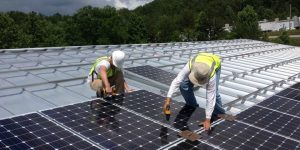
The solar workforce in the U.S. has grown by over 160% since 2010 for a little over 93,000 to well over 250,000. Solar accounts for less than 2% of all electrical energy generation in the U.S. However, the solar industry employs twice as many workers as the coal industry, almost five times as many as nuclear power, and about the same number as the natural gas industry.
The largest sector of jobs is in installation of the PV equipment and systems at 51%. The second largest sector is in manufacturing of equipment and materials at 16%. Project development is third at 14%, sales and distribution is fourth at 12%, and the remaining jobs are in various sectors at 7%.
These figures indicate that the best job opportunities will be in the installation sector and that would be correct. This will require a certain amount of training to make yourself attractive to an employer and the solar industry in general. The most difficult positions for employers to fill are, (1) Sales Professionals, (2) Electricians and (3) Installers. If it is possible to get retrained to fill the roll of one of these professional groups, your prospects for employment are very good.
It may also be possible that your present skill will be attractive to an employer in this industry. Every solar contractor or developer needs workers who possess a variety of skill sets. Aside from developing skills listed in the previous paragraph, here are some job skills that are always be required by some of the personal within each company:
- An understanding of IP and computer communication are necessary skills since all solar electronic equipment is now built to communicate within its own network and with the internet.
- A proficient understanding of computer programs and the ability to bridge computational and drawing programs with DOE and Google type programs is essential to most solar companies.
- Writing and editing skills are always necessary when communication with other people and groups is common; this is an undervalued skill that can can make a big difference in the success of a company.
The best way to get into this industry as an employee or as a contractor is to first look at the skills you now possess and see where you would fit in. The next step is to get enough training with solar sales and design to get you started and continue training as you move up the ladder to success.
Kelly Provence
IREC Certified Master PV Trainer
NABCEP Certified Professional PV Installer
Master Electrician
Solairgen School of Solar Training